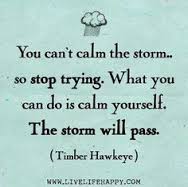The inauguration coverage this weekend stirred up strong emotions on both sides of the party line. Whether good or bad, in your opinion, it served as a powerful reminder that change at any scale can mean stress. A study called the Holmes-Rahe Stress Inventory lists 43 events that can cause stress in your life and how those stressors can cause a wide range of mental and physical illness. Interestingly, out of those 43, roughly half were things that could be positive changes to your life: marriage, quitting smoking, getting a promotion, graduating, purchasing a home, having a baby, or even achieving a personal milestone among others. Most interesting is the fact that many of the events could be considered small changes. Changes in sleep habits, social activities, or even eating habits can be stressors. The study found that whether the change was positive or negative, the effect on your peace of mind can be impactful.
In essence, change is stress. It doesn’t matter whether it is a big change or a small one, stress can be overwhelming. Finding a way to manage stress is critical to a healthy and vibrant life.
So how do we manage stress?
The first key is to recognize where stress is in your life. There are many quick online assessments that you can take to give yourself a head start on figuring out where you might be getting stressed out and a quick search on your smartphone will uncover a variety of stress apps that you can use on the go. The key is to pinpoint those items in your life that are causing you stress so that you can make a plan to address them. If you prefer to go old school, simply start keeping a daily journal. One inventive method is to get a stack of 3×5 notecards and a box. Whenever you feel yourself becoming stressed, write down the stressor on the notecard and put it in the box. At the end of the week, take a look at all of the cards and see if you can recognize any patterns.
Once you’ve identified your particular stressors, the next step is managing them. This thought can be overwhelming, but as the adage goes, you can eat an elephant if you take it one bite at a time. To prevent overwhelm, reduce something big into something smaller. If it is a large task, reduce it into many smaller steps so that you can give yourself a realistic process for completing a task. You can even increase the odds of completion by adding milestone gifts for yourself. If the stressor is more of an interpersonal nature, you can reduce overwhelm by not going at it alone. Confide in a friend or family member. If anonymity is important to you, there are many online, telephone support groups or crisis lines (links below) that can be extremely beneficial. Individual and group therapy can also provide a safe place to explore issues in-depth. The key is to remember that you do not have to face it alone. There are many options available.
Last but certainly not least, just breathe! There is nothing that isn’t manageable. You only need the right tool for the right job. And sometimes, just taking a moment to quiet your mind and doing some mindful breathing can be just the tool. If meditation seems daunting, start with simple breathing exercises. To calm your mind, set a timer for two minutes and inhale slowly through your nose and exhale through your mouth. This practice can trigger your parasympathetic nervous system and help you to relax and think more clearly.
Ultimately, there are many tools available to help manage the multitude of events that get thrown our way. Take advantage of them. Don’t be afraid to reach out for help. If the choice is to remain stagnant and not get past those things that keep us stuck versus stepping out on a limb and doing something uncomfortable by asking for help, the end does justify the means.
New Mexico Crisis Line
www.nmcrisisline.com
1-855-nmcrisis (662-7474)
”Lifeline Crisis Chat is a joint service of the National Suicide Prevention Lifeline in partnership with CONTACT USA. It is the first service of its kind where crisis centers across the United States have joined together to form one national chat network that can provide online emotional support, crisis intervention, and suicide prevention services. All crisis centers that participate in the Lifeline Crisis Chat program are members of the Lifeline phone network and are required to be accredited by CONTACT USA in the area of online emotional support.” (www.crisischat.org)
National Suicide Prevention Hotline
1-800-273-8255

Clinical Director Therapist
Lana Reihani, LPCC, is a Clinical Mental Health Therapist, Clinical Supervisor, and Clinical Director with Sage Neuroscience Center. She is passionate about strengthening evidence-based clinical practices with radical empathy and a touch of humor, delivered with safety, equality, and diversity in mind. In her free time, Lana loves to learn, cook, find the best light for selfies, share amazing memes, and watch trashy reality TV.
Read Lana Reihani’s Full Bio | Browse All Articles Written by Lana Reihani, LPCC

